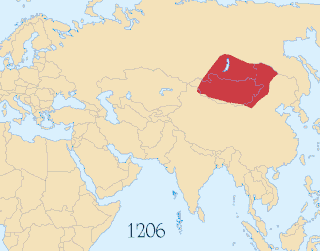This article does not cite any sources .(November 2011) (Learn how and when to remove this template message) |
Sartaqtai was a son of the first emperor of the Mongol Empire, Genghis Khan. His name was made into a title, meaning "Arslan of the Sart", and was bestowed upon Prince of Karluks.

The Mongol Empire existed during the 13th and 14th centuries and was the largest contiguous land empire in history. Originating in the steppes of Central Asia, the Mongol Empire eventually stretched from Eastern Europe and parts of Central Europe to the Sea of Japan, extending northwards into Siberia, eastwards and southwards into the Indian subcontinent, Indochina and the Iranian Plateau; and westwards as far as the Levant and the Carpathian Mountains.

Genghis Khan was the founder and first Great Khan of the Mongol Empire, which became the largest contiguous empire in history after his death. He came to power by uniting many of the nomadic tribes of Northeast Asia. After founding the Empire and being proclaimed "Genghis Khan", he launched the Mongol invasions that conquered most of Eurasia. Campaigns initiated in his lifetime include those against the Qara Khitai, Caucasus, and Khwarazmian, Western Xia and Jin dynasties. These campaigns were often accompanied by large-scale massacres of the civilian populations – especially in the Khwarazmian and Western Xia controlled lands. By the end of his life, the Mongol Empire occupied a substantial portion of Central Asia and China.
Arslan Khan was the prince of the Karluks. Mongol emperor Genghis Khan commanded that Arslan Khan be given the title Sartaqtai, which was said to by synonymous with Tajik. It was also the name of one of the Khan's sons.
| This Mongolian biographical article is a stub. You can help Wikipedia by expanding it. |